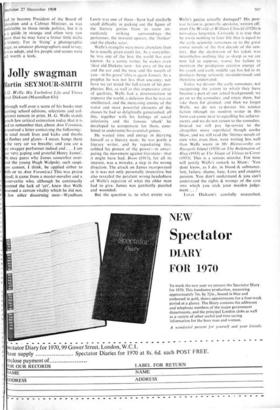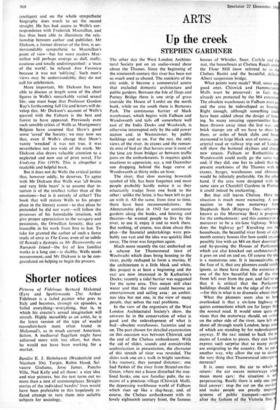Jolly swagman
Martin SEYMOUR-SMITH
'I G. Wells: His Turbulent Life and Times sat Dickson (Macmillan 63s) Ithough well over a score of his books (not unting school editions, selections and col- mions) remain in print, H. G. Wells stands -such low critical estimation today that it is to remember that, about Ann Veronica, received a letter containing the following: e total result lives and kicks and throbs id flushes and glares—I mean, hangs there the very air we breathe; and you are a ry swagger performer indeed and ... I am our very gaping and grateful Henry James'.
e may guess why James somewhat over- ed the young Hugh Walpole; such suspi-
ns cannot, I think, be applied either to
Its or to Ann Veronica.) This was praise eed; it came from a master-novelist and a ster-critic who, although he continually ented the lack of `art', knew that Wells sessed a certain vitality which he did not.
few other discerning men—Wyndham Lewis was one of them—have had similarly small difficulty in picking out the figure of the literary genius from its more im- mediately striking surroundings—the performer, the insistent upstart, the 'thinker' and the cheeky satyr.
Wells's strengths were more abundant than he is usually given credit for. As a storyteller, he was one of the best the world has ever known. As a comic writer, he makes esen `dear old Dickens turn—for envy of the eye and the ear and the nose and the mouth of you—in his grave' (this is again James). As a prophet he was not less than uncanny; nor have we yet tested the full extent of his pro- phecies. But, as well as this impressive array of qualities, Wells had a determination to improve the world, a delusion that he was an intellectual, and the increasing enmity of the worst and most powerful elements of the classes he had so delightedly gatecrashed; all this, together with his feelings of social inferiority and the famous 'cheek' he developed to compensate for them, com- bined to undermine his essential genius.
He wasted time and energy in decrying himself as a literary man : he was partly a literary writer, and by repudiating this, robbed his protest of the power—in antici- pating the movement against literature—that it might have had. Boon (1915), for all its interest, was a mistake, a step in the wrong direction. The attack on James incorporated in it was not only personally insensitive but also revealed the petulant wrong-headedness of Wells's rejection of what the older man had to give. James was justifiably puzzled and wounded.
But the question is, to what extent was Wells's genius actually damaged? His post- war tiction is. generally speaking, written off; even The World of William Clissold (1926) is nowadays forgotten. Certainly it is true that he wrote nothing in later life that is equal to the early scientific romances or to the great comic novels of the first decade of the cen- tury. But the declension of his talent was nevertheless nothing like as sharp as we are now led to suppose: worse, his failure to maintain the prodigious creative energy of his youth and early middle age has led to its products being seriously misunderstood and therefore underrated.
Today we devour the early romances, not recognising the extent to which they have become a part of our actual background; we go on to the comedies, and enjoy them, but take them for granted; and then we forget Wells; we do not re-devour his science fiction (though no modern writer in this form can come near to equalling his achieve- ment), and we do not return to the comedies. Instead we still pay lip-service to the altogether more superficial though cooler Shaw, and we still read the 'thirties novels of men who, even then, were writing less well than Wells wrote in Mr Blettsworthy on Rampole Island (1928) or The Bulpington of Blup (1933) or The Shape of Things to Come (1933). This is a serious mistake. For time will justify Wells's remark to Shaw: 'You dont know, as I do, in blood & substance. lust, failure, shame, hate, Love and creative passion. You don't understand & you can't understand the rights & wrongs of the case into which you stick your maiden judge- ment ..
Lovat Dickson's carefully researched, intelligent and on the whole sympathetic biography does much to set the record straight. He has had access to Wells's cor- respondence with Frederick Macmillan, and has thus been able to illuminate the rela- tionship between author and publisher. Mr Dickson, a former director of the firm, is un- derstandably sympathetic to Macmillan's point of view—but for most readers Mac- millan will perhaps emerge as dull, stuffy, cautious and totally undistinguished : a 'man of the world', he refused Ann Veronica because it was not 'edifying'. Such men's views may be understandable; they do not call for celebration.
More important, Mr Dickson has been able to discuss at length some of the chief figures in Wells's remarkably varied sexual life; one must hope that Professor Gordon Ray's forthcoming full life and letters will de- velop this. Mr Dickson's account of Wells's quarrel with the Fabians is the best and fairest to have appeared. Previously even such sensible critics of Wells as Montgomery Belgion have assumed that Shaw's good sense 'saved' the Society; we may now see that, even if Wells's charge that Shaw's vanity 'wrecked' it was not true, it was nevertheless not too wide of the mark. Mr Dickson also draws valuable attention to a neglected and now out of print novel, The Undying Fire (1919). This is altogether a readable and helpful book.
But it does not do Wells the critical justice that, however oddly, he deserves. To agree with Mr Dickson that Wells was 'all brains and very little heart' is to assume that in- tuition is of the intellect rather than of the emotions—but is it entirely Of either? The book that will restore Wells to his proper place in the literary canon—to that place he pretended he did not want—will follow the processes of his formidable intuition, will give proper appreciation to the savagery and pessimism, the Orwellian ferocity, that are traceable in his work from first to last. To take for granted the author of such a fierce study of envy as The Cone, even of so subtle (if flawed) a dystopia as Mr Blettsworthy on Ram pole Island—the list of less familiar works is a long one—is shabby. Wells needs reassessment?-and Mr Dickson is to be con- gratulated on helping to begin the process.















































 Previous page
Previous page